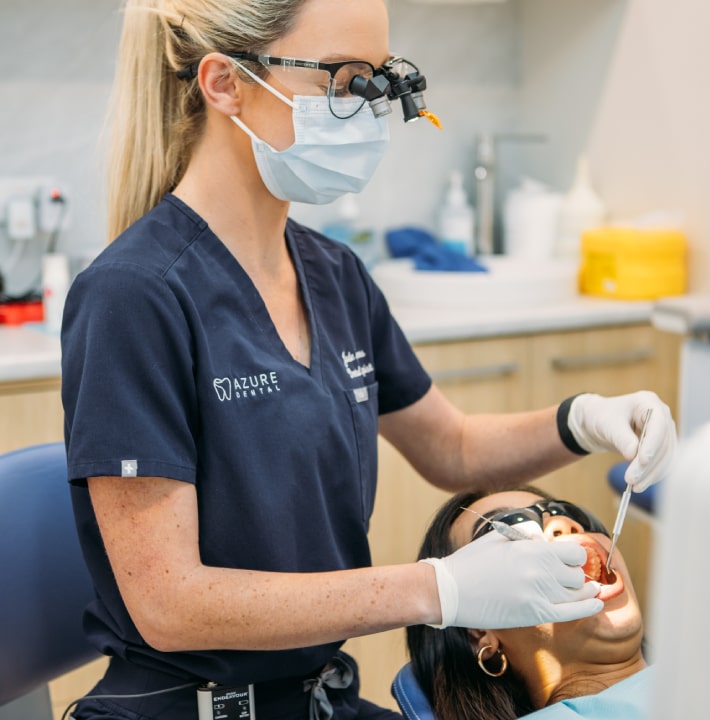Tooth Extractions
When You Need Effective Relief
Get effective relief with tooth extractions. Our gentle and professional team consistently delivers a comfortable experience, prioritising your dental health and quick recovery.

What Makes Tooth Extractions a Vital Part of Comprehensive Dental Care Plans?
Ignoring a damaged or decayed tooth can cause serious oral health issues, including infections, gum disease, and teeth misalignment. This can cause pain, discomfort, and difficulty eating. It also increases the risk of losing more teeth, which can affect dental health, confidence, and quality of life.
Tooth extractions are a vital part of comprehensive dental care and treatment plans. They help alleviate pain and prevent further complications, promoting long-term oral health and improved overall well-being.

Determining if You Are a Candidate for a Tooth Extraction Procedure
Certain conditions may indicate the need for a tooth extraction to maintain your oral health. Here are four key factors that might make you a candidate for a tooth extraction:
- Severe Tooth Decay:
When decay is beyond restoration, removing the affected tooth may be necessary to prevent further damage. - Gum Disease:
Compromised gum health can weaken teeth and their supporting structures, making extraction the ideal option. - Crowded Teeth:
Extraction may be needed before orthodontic treatment to create adequate space for proper alignment. - Impacted Teeth:
Teeth that don’t fully erupt can cause significant pain, inflammation, or infections, making extraction essential.
Exploring the Long-Term Benefits of Tooth Extractions for Dental Wellness
Tooth extractions are sometimes necessary for maintaining long-term oral health and overall comfort. Beyond immediate pain relief, tooth extractions provide several benefits that help promote a healthier smile and overall well-being:
- Prevents Infection Spread:
Removing a severely infected tooth prevents the bacteria from spreading to nearby teeth and gums. - Protects Adjacent Teeth:
Extractions prevent neighbouring teeth from being damaged, decayed, or shifting out of alignment. - Improves Oral Function:
Tooth extractions reduce discomfort, making chewing, speaking, and eating easier. - Supports Orthodontic Treatment:
Tooth removal creates adequate space for optimal tooth movement and alignment, significantly enhancing the success of braces or aligners.

Schedule Your Consultation Today
Experience Exceptional Dental Treatments for a Healthier, Brighter Smile

Frequently Asked Questions
When is tooth extraction necessary?
Tooth extraction is a dental procedure that may be recommended for various reasons. Here’s a breakdown of when tooth extraction might be necessary:
- Severe Decay or Damage:
When decay reaches the pulp space where the nerves of the tooth are, or a tooth is severely cracked, extraction may be needed to prevent infection. - Impacted Wisdom Teeth:
Impacted wisdom teeth can cause pain, misalignment, and infections. Extraction prevents complications and protects neighbouring teeth. - Overcrowding:
When the mouth is too small, extraction is performed to create space for proper tooth alignment, usually before braces. - Risk of Infection:
If a tooth infection cannot be addressed with a root canal treatment, extraction prevents the further spread of infection and protects oral health. - Advanced Gum Disease:
Severe periodontal disease can cause teeth to lose their attachment. Extraction may be needed to prevent pain when biting or sudden removal of a tooth. - Tooth Fractures:
A deep fracture may render a tooth unrestorable, making extraction the most suitable option to avoid pain and infection.
Preparing for - Dentures/Implants:
Extracting unhealthy teeth allows for the proper fit and function of dentures or implants. - Immune-Compromised Patients:
Patients with weakened immune systems may need extractions to prevent infections that could complicate their health.
The previous list explains situations where tooth extractions are commonly performed, helping patients feel informed and confident. If you’re seeking tooth extractions in Inglewood, contact us today.
Is a tooth extraction procedure painful?
Many patients wonder about the pain involved during tooth extraction. Below is an explanation of whether a tooth extraction procedure is painful:
- Pre-Extraction:
Before the extraction, the dentist administers a local anaesthetic to numb the area around the tooth. This allows patients to remain pain-free during the procedure itself. The numbing sensation takes effect quickly, blocking pain receptors in the area. - During Extraction:
The anaesthetic numbs the surrounding tissue, so patients generally don’t feel pain during the extraction. However, they may feel pressure or movement as the tooth is being removed. Sedation options, such as IV sedation, are used to maintain comfort during complex extractions, such as impacted wisdom teeth removal. - Post-Extraction:
After the procedure, mild to moderate pain is common as the anaesthetic wears off. Discomfort usually peaks within 24-48 hours and then gradually subsides. Swelling, bruising, or a dull ache at the extraction site are common complications post-tooth extraction for many patients. Over-the-counter pain relief, cold compresses, and following aftercare instructions help manage post-extraction pain effectively.
Follow post-operative care instructions to help minimise pain after tooth extraction and promote healing. If significant pain persists after the extraction, contact a dental professional for further evaluation.
How long does it take to recover from a tooth extraction?
Tooth extraction recovery varies based on factors like extraction complexity and the patient’s individual healing response. Below is a breakdown of what to expect:
- First 24-48 hours:
A blood clot forms and initial healing begins. Swelling and pain are common complications post-tooth extraction, but they should start to decrease within 1-2 days. - Three to Seven Days:
Soft tissue healing progresses, and discomfort lessens. By this time, most patients can resume normal activities. - One to Two Weeks:
Gums usually heal within 7-14 days. If stitches are used, they are usually removed at this time. - Three to Six Months:
The underlying bone heals, which is essential if the patient plans for dental implants.
Following your dentist’s aftercare instructions will promote a smooth tooth extraction recovery and reduce the risk of complications. Overall, most patients feel comfortable within a week, but full recovery can take several months due to bone healing.
What should I expect during a tooth extraction procedure?
Undergoing a tooth extraction can feel daunting, but knowing what to expect helps ease any concerns. Here’s an overview of what generally happens during a tooth extraction procedure:
- Initial Consultation and Evaluation:
Your dentist will examine your tooth and surrounding area with X-rays to determine the most suitable extraction approach. They will review your medical history and discuss medications to avoid risks or complications. The dentist will explain the need for extraction, discuss the procedure, and answer any questions you may have. - Extraction Process:
For visible teeth, the dentist will loosen the tooth with an elevator tool and then extract it using forceps. If a tooth is impacted or broken, the dentist may need to incise the gum and remove bone tissue. Sometimes, the tooth may need to be broken into smaller pieces to make it easier to remove. - Sensation During Extraction:
You’ll feel pressure as the dentist works, but there shouldn’t be any sharp pain due to the local anaesthetic. Your dentist will keep you informed of each step so you know what to expect throughout the procedure. - Post-Extraction Procedures:
After the tooth is removed, the dentist will clean the socket to remove any debris or infection. In some cases, they may place stitches to close the gums, especially in surgical extractions. - Gauze Placement and Bleeding Control:
Gauze will be positioned over the extraction site to help manage bleeding. You’ll be asked to bite down gently to help form a blood clot, which is essential for proper healing.
Understanding each step and knowing how to manage common complications post-tooth extraction can ease fear and help you feel prepared. Azure Dental is committed to providing a comfortable, stress-free experience with exceptional care at every stage.
How do I prepare for a tooth extraction appointment?
Preparing for a tooth extraction can help reduce anxiety and promote a smooth experience. Below is a guide on how to get ready:
- Discuss your medical history:
Share all relevant medical information with your dentist, including any medications, allergies, and existing health conditions. This helps your dentist plan the procedure safely. - Questions:
Ask your dentist about the procedure, recovery time, and managing pain after tooth extraction or any other concerns. Understanding the process can help you feel more at ease. - Follow pre-extraction instructions:
Your dentist may provide specific instructions depending on your case. This may involve fasting before sedation or avoiding medications that could affect blood clotting, as advised by your medical doctor. - Arrange transportation:
If you’re having sedation or general anaesthesia, arrange for someone to drive you to and from the clinic. You’ll likely feel groggy afterwards. - Eat appropriately:
For those using local anaesthesia, you may be advised to eat a light meal 2-3 hours before the procedure. If sedation or general anaesthesia is involved, you need to avoid food and drink for 6–8 hours beforehand. - Dress comfortably:
Wear loose, comfortable clothing to your appointment. If you’re having sedation, wear short sleeves for easy access to your arm for IV medication if needed. - Plan for aftercare:
Stock up on soft foods, like soups, yoghurt, and smoothies, to eat after the procedure. You might also want to get over-the-counter pain relief medications, as suggested by your dentist. - Avoid smoking and alcohol:
Refrain from smoking or consuming alcohol before your appointment, as these can hinder healing and complicate the procedure.
By following these guidelines, you’ll be well-prepared for tooth extraction, which will help make the process smoother and aid in your recovery.
Always consult with your dentist for any specific instructions tailored to your situation.
Can I eat or drink before a tooth extraction?
Before undergoing a tooth extraction, it’s important to understand how eating or drinking beforehand can impact the procedure. Here’s an outline of what you should know:
- General Guidance on Fasting:
If you’re scheduled for a local anaesthetic, generally, you do not need to fast. You can eat a light meal before your appointment. Avoid heavy meals to prevent vomiting. Fasting is usually required for those undergoing general anaesthesia or sedation. You should avoid eating or drinking for 6–8 hours before the procedure to prevent complications like nausea or choking. - Drinking Water:
If advised to fast, you’ll likely be told to avoid consuming liquids, including water, before the extraction. Always follow your dentist’s specific instructions. - Medications:
If you’re on medication that needs to be taken with food, consult your dentist. You can usually drink small sips of water up to two hours before your procedure, depending on the anaesthetic type. - Avoiding Alcohol or Caffeine:
It’s important to avoid alcohol and caffeine prior to a tooth extraction. These can interfere with anaesthesia and affect your body’s ability to heal post-surgery. Stick to water or other non-stimulating beverages if you are not under fasting instructions. - For Children or High-Risk Patients:
For children or patients with medical conditions like diabetes, specific instructions will be provided to maintain safety. In such cases, fasting guidelines may be adjusted to accommodate their unique health needs.
Follow these guidelines and consult your dental provider for a smooth and safe tooth extraction experience.
What aftercare steps should I follow after my tooth extraction?
Tooth extraction recovery is an important part of the healing process, and these are the aftercare practices you should follow:
- Rest and Recovery:
Take it easy for the rest of the day after your extraction. Avoid strenuous activities or heavy lifting for at least 24 hours, as these can increase blood flow and cause bleeding. - Manage Bleeding:
Bite down gently on the gauze pad provided by your dentist for 30 minutes to allow for the formation of a blood clot. If bleeding continues, replace the gauze and bite down firmly for another 30 minutes. Avoid spitting, rinsing vigorously, or using a straw for 24 hours to prevent dislodging the blood clot and delaying healing. - Pain Management:
Take any prescribed pain relief medication as directed by your dentist. Over-the-counter options may also be recommended. Apply a cold pack to the outside of your face in 10-20 minute intervals to reduce swelling and numb the pain. If pain after tooth extraction becomes severe or prolonged, consult your dentist. - Avoid Disturbing the Extraction Site:
Do not touch the area with your fingers or tongue to avoid infection. Eat soft foods like soup, mashed potatoes, or yoghurt for the first 24-48 hours. Avoid hot drinks, alcohol, and smoking, as these can interfere with healing. - Oral Hygiene:
Avoid brushing the extraction site directly for the first day, but maintain your normal oral hygiene routine elsewhere. After 24 hours, you may start rinsing your mouth with salt water (half a teaspoon in warm water) a few times daily to reduce swelling. - Monitor Healing:
Mild swelling, bruising, and discomfort are normal, but contact your dentist if you notice excessive pain or infection. Follow up with your dentist for any post-procedure checkups, especially if stitches were used.
How much does a tooth extraction cost?
The cost of a tooth extraction can vary depending on several factors. It’s important to understand the factors influencing the price to let you choose the most suitable treatment option. Below are some key factors that affect the cost of a tooth extraction:
- Type of Extraction:
A simple extraction costs less as it involves the removal of a visible and easily accessible tooth. These are usually performed under local anaesthesia. Surgical tooth extractions, like wisdom tooth extraction, are more costly due to their complexity, and costs start at $400. This is recommended when a tooth is impacted, broken below the gum line, or needs gum incision for extraction. - Location of the Tooth:
Wisdom teeth often cost more than extracting front teeth due to the complexity and position in the mouth. - Anaesthesia and Sedation Options:
Local anaesthesia is generally included in the cost of a simple extraction. If sedation (such as nitrous oxide or IV sedation) is required for a more complicated procedure, this can increase the cost. The level of sedation chosen impacts the final price. - Dentist Experience:
Experienced dentists may charge more than general dentists. However, their skill and experience can be invaluable, especially in complex extractions. - Location of the Dental Clinic:
Prices can vary depending on the region or city. Practices in metropolitan areas may charge more compared to those in regional locations. - Additional Procedures:
Sometimes, extractions are combined with other dental procedures, like bone grafting, which prepares the site for dental implants. These added procedures can increase the overall cost.
At Azure Dental, we provide clear and upfront pricing to help you understand the financial commitment of your treatment. For an accurate estimate, consult our friendly team, who will guide you through options based on your specific situation.
Patient Reviews
Discover what our patients have to say in their reviews as they share their personal experiences with our exceptional dental care services.